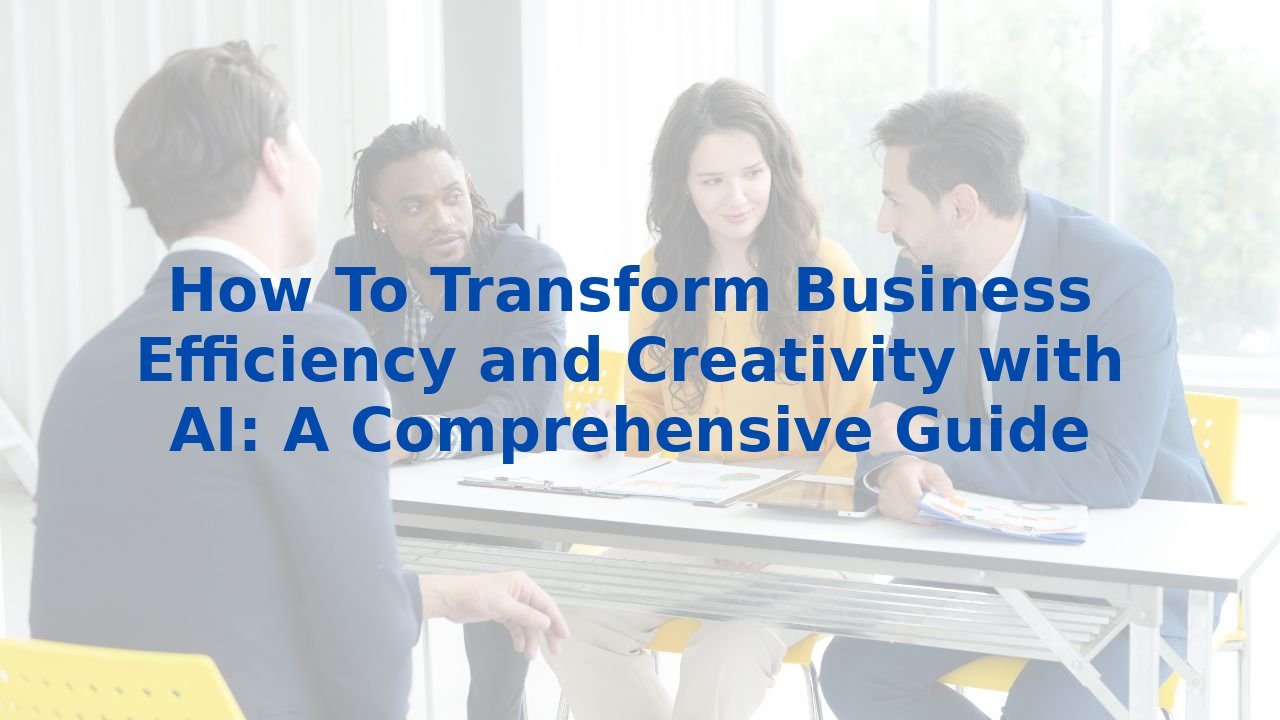How To Transform Business Efficiency and Creativity with AI: A Comprehensive Guide
How To Transform Business Efficiency and Creativity with AI: A Comprehensive Guide
Introduction
In the modern business landscape, where the pace of change is constant and relentless, efficiency and innovation aren't just buzzwords; they're imperatives. The infusion of Artificial Intelligence (AI) into business processes has become a game changer, offering organizations a pathway not only to streamline operations but also to spark creativity. In this guide, we will explore how AI enhances various facets of business—from customer experience to digital marketing—and underscore the critical importance of training employees for successful AI integration.
Enhancing Instructional Design with AI
At the heart of effective workforce development lies instructional design. Enter AI: a powerful ally in automating tasks like content generation and analysis. Think of generative AI tools that can produce learning objectives and materials in mere minutes. However, here's the catch—while they can churn out content quickly, they lack the nuanced understanding of context that only a human touch can provide. Misalignment with organizational goals or unintentional biases can compromise training outcomes.
Organizations must take the reins of AI technology with robust data management and employee training. By integrating AI with human oversight, businesses can harness its capabilities while safeguarding against bias, ensuring a training program that is both effective and aligned with broader company objectives.
Streamlining Customer Experience with AI
The customer experience has been markedly redefined by AI. With the aid of Natural Language Processing (NLP), AI can conduct deep analyses of customer feedback, summarizing calls in contact centers for a streamlined understanding. This not only saves valuable time but also boosts employee productivity, greatly enhancing overall customer satisfaction.
In addition to streamlined feedback, AI-powered chatbots have emerged as frontline attendants in customer support. These virtual agents can tackle routine inquiries, allowing human colleagues to focus on complex issues that require a personal touch. The result? An efficient system where both customers and employees feel valued.
Optimizing Digital Marketing with AI
Digital marketing strategies have been revolutionized by the vast analytical powers of AI. By examining mountains of data, AI delivers insights that illuminate customer behavior patterns, preferences, and demographics. Such intelligence enables the design of targeted marketing campaigns that resonate on a deeper level with potential customers.
Moreover, AI doesn't stop at analysis; it actively contributes to content creation. By suggesting keywords and optimizing content for better visibility in search engine rankings, it paves the way for marketing strategies that are not only effective but also sustainable. The enhanced efficiency of AI-led automation in social media management allows businesses to deploy campaigns that engage audiences and maintain a consistent presence across platforms.
Fostering Creativity and Sustainability
One might assume AI's primary function is automation, but it offers much more—it can be a catalyst for creativity. By recognizing patterns and trends buried within complex datasets, AI enables businesses to think outside the box, uncovering innovative solutions and ideas that might otherwise go unnoticed. This enriched creativity translates directly into products and services that are more tightly aligned with customer needs.
Furthermore, AI can significantly contribute to sustainability efforts by analyzing and predicting energy consumption patterns. By optimizing resource use, companies not only improve their operational efficiency but also contribute to a sustainable future. Imagine an organization that leverages AI capabilities to make informed decisions about resource allocation, waste reduction, and energy conservation—this is smart business in action.
The Importance of AI Training for Employees
To fully unlock the potential of AI, employee training is non-negotiable. However, it's not about a one-size-fits-all approach; it’s essential to impart knowledge tailored to specific roles within the organization. Workers must understand how to wield AI tools effectively, navigating them within the context of their daily responsibilities.
Training programs should also encompass responsible AI practices, emphasizing aspects like data management and bias mitigation. This proactive approach ensures that employees are not just passive users of technology but responsible stewards who can harness AI's power without compromising the integrity of their organization.
Conclusion
The dialogue around AI in business is often framed as a fear of replacement, but it's far more progressive than that. It’s about augmentation—using AI to enhance human creativity, boost operational efficiency, and foster an innovative culture. However, success hinges on a thoughtful approach that prioritizes employee training and strategic integration. As organizations embrace these transformations, they not only unlock new avenues for innovation and growth but also empower their workforce to thrive in an increasingly complex business environment.
For those eager to stay ahead, investing in comprehensive AI training is a formidable step toward a brighter, more efficient future. Organizations can explore avenues for tailored programs that address unique needs, ensuring a workforce that's not only proficient in AI but also equipped to lead in the digital age.



